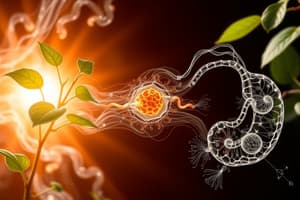Podcast
Questions and Answers
What is the main purpose of respiration in living organisms?
What is the main purpose of respiration in living organisms?
- To break down sugar without using oxygen
- To exchange gases between the body's cells and the external environment (correct)
- To create a protective barrier against harmful gases
- To produce energy for photosynthesis in plants
Which type of respiration requires oxygen to produce energy from foodstuffs?
Which type of respiration requires oxygen to produce energy from foodstuffs?
- Photosynthesis
- Cellular respiration (correct)
- Fermentation
- Anaerobic respiration
What is the role of gills in animals like fish?
What is the role of gills in animals like fish?
- To aid in the process of photosynthesis
- To store excess nutrients for energy production
- To release carbon dioxide from the body
- To extract oxygen directly from water (correct)
How do plants primarily obtain the fuel needed for respiration?
How do plants primarily obtain the fuel needed for respiration?
Which statement best describes the relationship between photosynthesis and respiration in living organisms?
Which statement best describes the relationship between photosynthesis and respiration in living organisms?
Why is understanding the process of respiration important for maintaining healthy environments?
Why is understanding the process of respiration important for maintaining healthy environments?
What distinguishes aerobic respiration from fermentation in terms of oxygen usage?
What distinguishes aerobic respiration from fermentation in terms of oxygen usage?
Flashcards are hidden until you start studying
Study Notes
Life processes refer to the various functions carried out by living organisms. One such life process is respiration, which involves exchanging gases between the body's cells and the external environment. Respiration can happen through either cellular respiration (or aerobic respiration), where oxygen from the air is used to produce energy from foodstuffs, or by fermentation, where sugar is broken down without using any oxygen. In plants, photosynthesis provides the fuel needed for all other types of respiration; in animals, it is food. This exchange of gases allows an organism to create energy to live and grow. For example, when you breathe in, your lungs take in oxygen, and when you exhale, they release carbon dioxide. Animals like fish also have specialized structures called gills which allow them to extract oxygen directly from water. While some simple life forms perform only one type of respiration, most higher forms need more complex systems. Understanding how this process works helps us understand the importance of maintaining healthy environments so that everything we eat, breath and drink stays clean and pure.
Studying That Suits You
Use AI to generate personalized quizzes and flashcards to suit your learning preferences.




